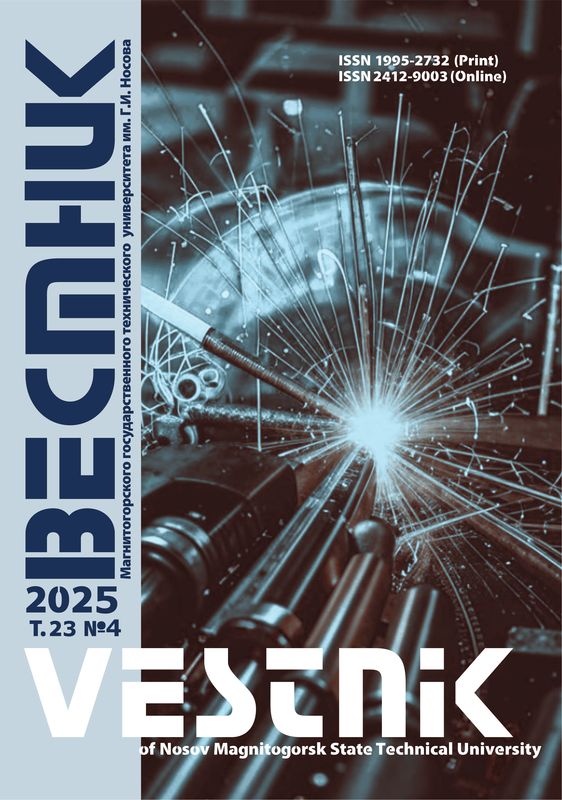DOI: 10.18503/1995-2732-2024-22-2-71-78
Abstract
Statement (Relevance). Environmental safety of uranium mining by in-situ leaching is determined by tightness of production strings of process wells both during construction and operation. The applied methods of geophysical surveys (current logging, flow measurement, induction logging) do not determine the true value of leaks of working fluids into annular space, since they are performed in modes that do not always correspond to the operating modes of wells during their operation. Objective. The research is aimed at considering the issues of quantitative determination of leaks due to break of tightness of production strings (mainly made of polymeric materials: pipes made of low-pressure polyethylene, HDPE, or unplasticized polyvinyl chloride, PVC), using various types of pressure testing agents: compressed air, liquid, liquid – compressed air systems. This article describes an applied method of analyzing hydraulic loads, acting on the production string, when performing various types of pressure tests with various types of agents. The author is the first to analyze in this paper various options for pressure testing of production strings of in-situ leaching process wells in relation to uranium mining. Result. The conducted studies result in providing a rationale for the options for pressure testing of wells, operating in the mode of injection of working fluids under excessive pressure. Practical Relevance. The performed analysis determines a rational option of pressure testing with the pressure parameters of the pressure testing agent, corresponding to the operating mode of operation of process wells. Based on the results of the analysis performed, the author made practical conclusions on the use of various methods for determining tightness of production strings.
Keywords
uranium, mining, process wells, production string, pressure testing, pressure testing agents, technical means, expansion packer
For citation
Ivanov A.G. Pressure Testing Methods for Production Strings of Process Wells of Uranium In-Situ Leaching. Vestnik Magnitogorskogo Gosudarstvennogo Tekhnicheskogo Universiteta im. G.I. Nosova [Vestnik of Nosov Magnitogorsk State Technical University]. 2024, vol. 22, no. 2, pp. 71-78. https://doi.org/10.18503/1995-2732-2024-22-2-71-78
1. Arsentyev Yu.A., Nazarov A.P., ZabaykinYu.V., Ivanov A.G. On the calculation of production strings from polymeric materials for the conditions of permafrost rocks. Aktualnye problemy i perspektivy razvitiya ekonomiki: rossiyskiy i zarubezhnyi opyt. Nauchnoe obozrenie [Current Problems and Prospects of Economic Development: Russian and Foreign Experience. Scientific Review]. 2019;(21):27-32. (In Russ.)
2. Solodov I.N. Dobycha urana podzemnym vyshchelachivaniem v kriolitozone [Uranium mining by in-situ leaching in the cryolithic zone]. Moscow: ZetaPrint, 2022, 183 p. (In Russ.)
3. Solodov I.N., Kamnev E.N. Geotekhnologiya urana (rossiyskiy opyt): monografiya [Geotechnology of uranium (Russian experience): monograph]. Moscow: KDU, Universitetskaya kniga, 2017, 576 p. (In Russ.)
4. Ivanov A.G., Ivanov D.A., Arsentyev Yu.A., Nazarov A.P., Kalinichev V.N. Features of the application of polymer casing pipes in the construction of process wells of underground leaching of uranium. Izvestiya vysshikh uchebnykh zavedeniy. Seriya «Geologiya i razvedka» [News of Higher Educational Institutions. Series: Geology and Exploration]. 2019;(4):50-57. (In Russ.)
5. Ivanov A.G., Mikhailov A.N., Alekseev N.A., Ivanov D.A., Arsentyev Yu.A., Nazarov A.P. Special work for the restoration and maintenance of the operating condition of production strings for process wells. Razvedka i okhrana nedr [Subsoil Exploration and Management]. 2020;(6):52-57. (In Russ.)
6. Ivanov A.G., Ivanov D.A., Arsentyev Yu.A., Soloviev N.V., Nazarov A.P., Barashkov I.A. Use of ash solutions of combined heat and power plants for prevention of contamination of the subsoil with technological solutions in the construction, repair and abandonment of wells of uranium underground leaching]. Razvedka i okhrana nedr [Subsoil Exploration and Management]. 2020(12):34-41. (In Russ.)
7. Mashkovtsev G.A., Konstantinov A.K., Miguta A.K. et al. Uran rossiyskikh nedr [Uranium of Russian subsoil]. Moscow: All-Russian Research Institute of Mineral Raw Resources, 2010, 850 p. (In Russ.)
8. Sergienko I.A., Mosev A.F., Bochko E.A., Pimenov M.K. Burenie i oborudovanie geotekhnologicheskikh skvazhin [Drilling and equipment of geotechnological wells]. Moscow: Nedra, 1984, 224 p. (In Russ.)
9. Svyatetskiy V.S., Polonyankina S.V. State and prospects of the development of the uranium mining industry in the Russian Federation. Pyatyi mezhdunarodnyi simpozium «Uran: geologiya, resursy, proizvodstvo» [The 5th International Symposium “Uranium: Geology, Resources, and Production”]. Moscow: All-Russian Research Institute of Mineral Raw Resources, 2021. (In Russ.)
10. Gladyshev A.V., Mikhailov A.N., Solodov I.N., Suvorov A.V. Influence of genetic features of uranium deposits of the Khiagda ore field on the choice of technology for the development of ore deposits by borehole underground leaching. Gornyi zhurnal [Mining Journal]. 2022;(4):13-17. (In Russ.)












